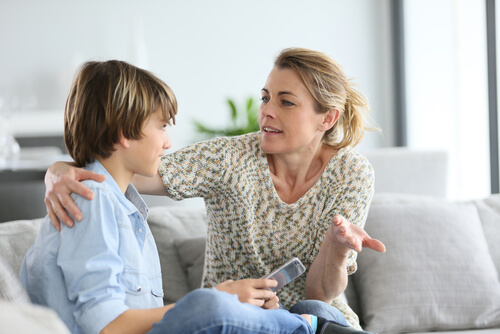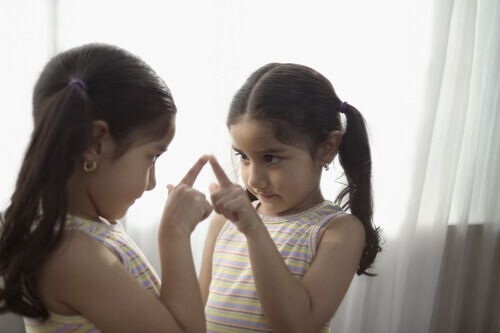20 Questions to Help Children Get to Know Themselves

As children grow and learn, one thing they come up against is how to know themselves. This means working out their characteristics, defects, virtues and preferences, among many other things. To encourage self-acceptance and understanding, as a parent, you should help your children get to know themselves better.
Although their identity will be more fully developed during adolescence, it’s still important for children to act in accordance with how they think. That way, they can trust their beliefs and thoughts as they come up against various challenges in early life.
The people around them are really important for this. Of course, this includes teachers and parents. At home, you can help your children get to know themselves better by asking them some simple questions in different life situations.
By doing this, your children will begin to understand the feelings they feel in each scenario. They’ll also start to identify their shortcomings and try to correct them for the future. In truth, it’s a very constructive exercise which could be extremely beneficial for their development.
Other Benefits
- Self-acceptance.
- Increase self-esteem.
- Better relationships with others.
- Develops independent thinking.
- More thought-out and less instinctive decision-making.
- Self-control: A better ability to understand and manage their emotions.
- Coherence: A better ability to act in accordance with their principles.
20 Questions to Help Children Get to Know Themselves Better
It’s important to let them work out their own responses. The key to this exercise is to provoke reflection. First, begin with “generic” questions to get them to evaluate their individual characteristics:
1. What are your strengths?
2. What are your fears? What would you do if you didn’t have them?

3. What do you like to do for fun?
4. What do you do when you have a problem? Is there someone who could help you solve it?
5. Where do you feel safest?
6. If you could make one wish, what would it be?
When Faced with a Frustrating Situation
For example, if they ever fail an exam, you could ask them what happened, how they felt when they found out their mistakes, and what motivates them to do well in life. This way, they’ll learn that failure happens in life and they can learn to deal with the frustration. It’ll also help them do better next time.
7. Why did it go badly?
8. Did you feel nervous or pressured?
9. Do you want to work hard to get better results?
10. How do you think you could do this?
“The thought ‘I am this body of flesh and bone’ is the origin of all other thoughts. This is why if I look inside and ask myself: ‘Where is that “I”?’, all thoughts (including the concept of “I”) will disappear, and the self-awareness will spontaneously arise”
– Ramana Maharshi
When Children Behave Badly
Knowing themselves will enable your children to understand and explain their impulsive behavior when they’re annoyed or angry. In those moments, you can ask them about their attitudes and reactions. They may also conceive of alternative reactions.
11. Why did you do it?
12. How was this behavior helpful?
13. How do you feel now?
Promoting Self-Awareness
According to various studies, the way an individual develops depends on the context they live in. For example, family, culture, gender, friendships, and other relationships with their peers.
In other words, how children understand themselves is the result of their relationship with their surroundings, their innate characteristics, and their life experiences. All of these things will shape their thoughts and understanding from day one.

Just like the previous questions, these questions help your children get to know themselves better and see their strengths and weaknesses. Some examples are:
14. What things do you believe which are different to other people?
15. If you had to say something nice, what would you say?
16. What do you like most about yourself?
17. What is your happiest memory?
18. What do you like to do when you’re sad? Does crying or screaming make you feel better?
19. What is your most important achievement? What would you like to achieve in the future?
20. What worries you and what excites you?
Your children may become a bit overwhelmed by so many questions and not know how to respond. It’s really important to give them time to think and come up with their own responses.
It’s also really important to choose the right moment for this sort of conversation. Your children need to be calm, relaxed, and feel comfortable telling you exactly what they think. Try it out.
Try to help your children get to know themselves better and you’ll make a great contribution to their personal development.
As children grow and learn, one thing they come up against is how to know themselves. This means working out their characteristics, defects, virtues and preferences, among many other things. To encourage self-acceptance and understanding, as a parent, you should help your children get to know themselves better.
Although their identity will be more fully developed during adolescence, it’s still important for children to act in accordance with how they think. That way, they can trust their beliefs and thoughts as they come up against various challenges in early life.
The people around them are really important for this. Of course, this includes teachers and parents. At home, you can help your children get to know themselves better by asking them some simple questions in different life situations.
By doing this, your children will begin to understand the feelings they feel in each scenario. They’ll also start to identify their shortcomings and try to correct them for the future. In truth, it’s a very constructive exercise which could be extremely beneficial for their development.
Other Benefits
- Self-acceptance.
- Increase self-esteem.
- Better relationships with others.
- Develops independent thinking.
- More thought-out and less instinctive decision-making.
- Self-control: A better ability to understand and manage their emotions.
- Coherence: A better ability to act in accordance with their principles.
20 Questions to Help Children Get to Know Themselves Better
It’s important to let them work out their own responses. The key to this exercise is to provoke reflection. First, begin with “generic” questions to get them to evaluate their individual characteristics:
1. What are your strengths?
2. What are your fears? What would you do if you didn’t have them?

3. What do you like to do for fun?
4. What do you do when you have a problem? Is there someone who could help you solve it?
5. Where do you feel safest?
6. If you could make one wish, what would it be?
When Faced with a Frustrating Situation
For example, if they ever fail an exam, you could ask them what happened, how they felt when they found out their mistakes, and what motivates them to do well in life. This way, they’ll learn that failure happens in life and they can learn to deal with the frustration. It’ll also help them do better next time.
7. Why did it go badly?
8. Did you feel nervous or pressured?
9. Do you want to work hard to get better results?
10. How do you think you could do this?
“The thought ‘I am this body of flesh and bone’ is the origin of all other thoughts. This is why if I look inside and ask myself: ‘Where is that “I”?’, all thoughts (including the concept of “I”) will disappear, and the self-awareness will spontaneously arise”
– Ramana Maharshi
When Children Behave Badly
Knowing themselves will enable your children to understand and explain their impulsive behavior when they’re annoyed or angry. In those moments, you can ask them about their attitudes and reactions. They may also conceive of alternative reactions.
11. Why did you do it?
12. How was this behavior helpful?
13. How do you feel now?
Promoting Self-Awareness
According to various studies, the way an individual develops depends on the context they live in. For example, family, culture, gender, friendships, and other relationships with their peers.
In other words, how children understand themselves is the result of their relationship with their surroundings, their innate characteristics, and their life experiences. All of these things will shape their thoughts and understanding from day one.

Just like the previous questions, these questions help your children get to know themselves better and see their strengths and weaknesses. Some examples are:
14. What things do you believe which are different to other people?
15. If you had to say something nice, what would you say?
16. What do you like most about yourself?
17. What is your happiest memory?
18. What do you like to do when you’re sad? Does crying or screaming make you feel better?
19. What is your most important achievement? What would you like to achieve in the future?
20. What worries you and what excites you?
Your children may become a bit overwhelmed by so many questions and not know how to respond. It’s really important to give them time to think and come up with their own responses.
It’s also really important to choose the right moment for this sort of conversation. Your children need to be calm, relaxed, and feel comfortable telling you exactly what they think. Try it out.
Try to help your children get to know themselves better and you’ll make a great contribution to their personal development.
All cited sources were thoroughly reviewed by our team to ensure their quality, reliability, currency, and validity. The bibliography of this article was considered reliable and of academic or scientific accuracy.
- Bernal Daza, L. J. (2019) Conciencia afectiva: un camino hacia la transformación del ser, desde el autoconocimiento. [Tesis de grado, Universidad Distrital Francisco José de Caldas]. Repositorio Institucional. Disponible en: https://repository.udistrital.edu.co/handle/11349/15427
- Clerici, Gonzalo Daniel; Elgier, Angel Manuel; Gago Galvagno, Lucas Gustavo; Garcia, Maria Julia; Azzollini, Susana Celeste; La contribución del entorno socioeconómico al autoconcepto y percepción infantil de las pautas parentales de crianza; Universidad Complutense de Madrid; Revista de Psicología y Educación; 15; 1; 1-2020; 87-97. Recuperado de: https://ri.conicet.gov.ar/handle/11336/146830
- Pulido Guerrero, E. G., Redondo Marín, M. P., Lora Carrillo, L. J., & Jiménez Ruiz, L. K. (2023). Medición del Autoconcepto: Una Revisión. Psykhe, 32(1). https://doi.org/10.7764/psykhe.2020.22389
- Valencia-Huertas, B. (2020) ¿Por qué formar alumnos autónomos? Acervo Digital Educativo del Gobierno de México. Disponible en: https://ade.edugem.gob.mx/handle/acervodigitaledu/50726
- Suanes, M. N. (2009). Autoconocimiento y autoestima. Temas para la educación, 3(5), 1-9. Recuperado de: https://feandalucia.ccoo.es/andalucia/docu/p5sd6409.pdf
- Quiroga, Flor, Capella, Claudia, Sepúlveda, Gabriela, Conca, Bárbara, & Miranda, Jenniffer. (2021). Identidad personal en niños y adolescentes: estudio cualitativo. Revista Latinoamericana de Ciencias Sociales, Niñez y Juventud, 19(2), 320-344. Epub October 05, 2021.https://doi.org/10.11600/rlcsnj.19.2.4448
- Merino Villeneuve, Inés. (2016). Una nueva vacuna: la vacuna del autoconocimiento. Bases neurobiológicas de la conducta humana. El juego entre el cerebro instintivo-emocional y el cerebro racional. Pediatría Atención Primaria, 18(70), 85-91. Recuperado en 22 de febrero de 2023, de http://scielo.isciii.es/scielo.php?script=sci_arttext&pid=S1139-76322016000200017&lng=es&tlng=es.
- Fernandes Sisto, Fermino, Marín Rueda, Fabián Javier, & Urquijo, Sebastián. (2010). Relación entre los constructos autocontrol y autoconcepto en niños y jóvenes. Liberabit, 16(2), 217-226. Recuperado en 23 de febrero de 2023, de http://www.scielo.org.pe/scielo.php?script=sci_arttext&pid=S1729-48272010000200011&lng=es&tlng=es.
This text is provided for informational purposes only and does not replace consultation with a professional. If in doubt, consult your specialist.








